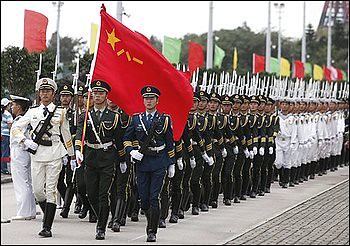
Chinese People's Liberation Army (PLA) personnel parade during the open day of Stonecutter Island Navy Base in Hong Kong Saturday, March 6, 2010., a photo by Pan-African News Wire File Photos on Flickr.
China struggles to channel anger as anti-Japan protests resume
Sun Sep 16, 2012 1:59am GMT
By Ben Blanchard and Jason Lee
BEIJING/CHENGDU, China, Sept 16 (Reuters) - A second day of torrid protests against Japan began in Chinese cities on Sunday, with the government struggling to find a balance between venting public anger and containing violence that could backfire ahead of a delicate leadership succession.
The protests over islands claimed by both countries broke out in Beijing and other cities on Saturday, when demonstrators besieged the Japanese embassy, hurling rocks, eggs and bottles, testing cordons of anti-riot police with shields and batons.
In other Chinese cities, demonstrators looted shops and attacked Japanese cars. Protesters also broke into a dozen Japanese-run factories in the eastern city of Qingdao, according to accounts on the Internet and in Japanese media.
The protests, the latest setback in long-troubled relations between Beijing and Tokyo, followed Japan's decision on Tuesday to buy the disputed islands, which Tokyo calls the Senkaku and Beijing calls the Diaoyu, from a private Japanese owner.
China has called that decision a provocative violation of its sovereignty.
On Sunday morning, a crowd of about 100 protesters resumed marching past the front of the Japanese embassy in Beijing, now guarded by a six-deep cordon of anti-riot police. Some protesters threw water bottles at the building.
"Japan, get the hell out of China!," some yelled in a now-familiar chant.
Crowds also gathered in the southwest city of Chengdu for another day of protests against Japan.
China's ruling Communist Party is preoccupied with a leadership turnover, with President Hu Jintao due to step down as party leader at a congress that could open as soon as next month. While the public indignation against Japan could help to foster unity ahead of the succession, it has also exposed widespread public impatience for a tougher line from Beijing.
"I think it's time for the Chinese government to get tougher. Look at what the ordinary people feel. The government should respond," a middle-aged Beijing man surnamed Xue told Reuters in front of the embassy late on Saturday.
"I don't mean war, but tougher action like sanctions. You can see how much Japan depends on our economy," he said.
Chinese state media responded to the protests by praising "rational" expressions of anger, while also warning that violence could backfire against Beijing.
"There has been some irrational behaviour that is to be regretted," said a commentary on the website of the People's Daily, the main paper of the Chinese Communist Party.
"Raging expressions of patriotism will only bring joy to the (Japanese) evil doers, put our foreign policy on the defensive and wound the feelings of compatriots."
The territorial dispute escalated on Friday when China sent six surveillance ships to the group of uninhabited islets in the East China Sea. China's state-run media have issued a torrent of condemnation against Tokyo.
Despite their deepening economic ties, China and Japan have long been at political odds over bitter memories of Japan's military aggression in the 1930s and 1940s and present-day rivalry over disputed territory in the East China Sea, which could contain valuable gas reserves.
Relations between Asia's two biggest economies chilled in 2010 after Japan arrested a Chinese trawler captain whose boat collided with Japanese coastguard vessels near the islands.
China's official Xinhua news agency said on Saturday big anti-Japan protests were also held in the Chinese cities of Xian, Changsha, Nanjing and Qingdao. Japanese media reported attacks on Japanese restaurants and other businesses.
No comments:
Post a Comment